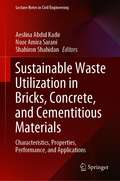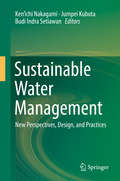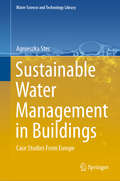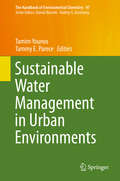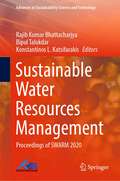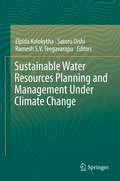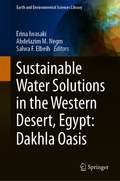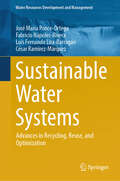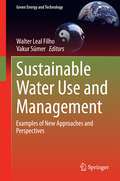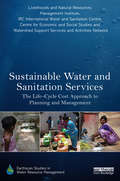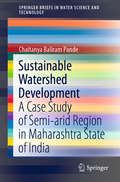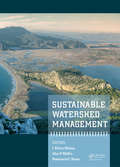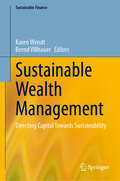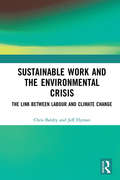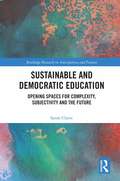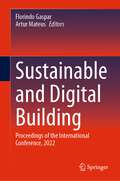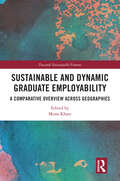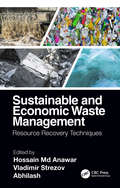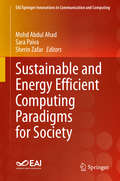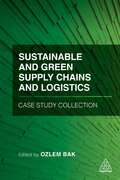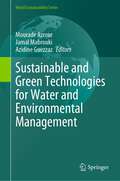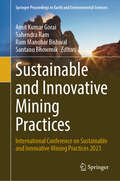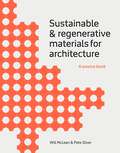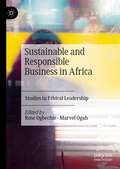- Table View
- List View
Sustainable Waste Utilization in Bricks, Concrete, and Cementitious Materials: Characteristics, Properties, Performance, and Applications (Lecture Notes in Civil Engineering #129)
by Shahiron Shahidan Aeslina Abdul Kadir Noor Amira SaraniThis book highlights the current research, conceptual and practical utilization of waste in building materials. It examines the production of industrial and agricultural wastes that have been generated worldwide and have significant environmental impact. The book discusses how to incorporate these wastes effectively with greener technology and how to address its environmental impact in order to produce environmentally friendly and sustainable green products. This book also will capitalize on its practical application, properties, performance and economic advantages. The topics covered include the physical, mechanical and environmental properties, leaching behaviour, gas emissions and performance of sustainable construction materials. This book offers a valuable reference for researchers, industries and interested stakeholders in sustainable construction or any allied fields.
Sustainable Water Management
by Ken'Ichi Nakagami Jumpei Kubota Budi Indra SetiawanThis book takes a new and critical look at the underlying factors that affect the management of water resources, and its content is guided by three important visions. With the "theory" vision, the existing knowledge system for IWRM is reorganized in order to supplement new theories related to our society and science. We then introduce two distinctive case studies on how to achieve sustainable water management. Based on the "social implementation" vision, one study is carried out by the Research Institute for Humanity and Nature on Indonesia's Bali Island, where there is a long history of educational and inspirational local-level water management systems with multistakeholder participation. A further study is based on the "harmony between science and society" vision, and the Ritsumeikan-Global Innovation Research Organization, Ritsumeikan University, proposes innovative water recycling system for the sustainable development of Chongming Island, an eco-island that belongs to China. These two studies highlight "science with society", a new perspective on science that could promisingly lead to more sustainable futures. This book offers a valuable reference guide for all stakeholders and scholars active in water resources management.
Sustainable Water Management in Buildings: Case Studies From Europe (Water Science and Technology Library #90)
by Agnieszka StecThis book expands the body of scientific knowledge on research and solutions for alternative water systems. It addresses a wide variety of water management issues in buildings, ranging from the technical possibilities, hydraulic and financial efficiency, and public acceptance of decentralized water systems, to their impact on sewage systems. Climate changes, population growth, and progressive urbanization are the main causes of the growing interest in alternative sources of water around the world. Decentralized systems are seen not only as solutions that can effectively save water, but also as systems that can operate partially or completely independently of centralized suppliers. With these aspects in mind, the main focus of this book is on showcasing a new approach to water management at the building scale. The findings and insights presented here will support the development of future technical guidelines for using alternative water systems in urban areas – an aspect that is particularly important since, in many European countries, these systems are only very rarely used.
Sustainable Water Management in Urban Environments
by Tamim Younos Tammy E. PareceThisvolume focuses on practical aspects of sustainable water management in urbanareas and presents a discussion of key concepts, methodologies, and casestudies of innovative and evolving technologies. Topics include: (1) challengesin urban water resiliency; (2) water and energy nexus; (3) integrated urbanwater management; and (4) water reuse options (black water, gray water,rainwater). This volume serves as a useful reference for students andresearchers involved in holistic approaches to water management, and as avaluable guide to experts in governmental agencies as well as planners andengineers concerned with sustainable water management systems in urbanenvironments.
Sustainable Water Resources Management: Proceedings of SWARM 2020 (Advances in Sustainability Science and Technology)
by Rajib Kumar Bhattacharjya Bipul Talukdar Konstantinos L. KatsifarakisThis book brings high-quality selected research articles from the international conference on Sustainable Water Resources Management (SWARM 2020), held at Assam Engineering College, Guwahati, Assam, India, during 19–21 June 2020. The book focuses on water management and planning, urban water management, climate change and global warming, management of groundwater and aquifer remediation, water conservation, water quality, pollution control, management of trans-boundary rivers, advanced hydrological modelling and hydro-disaster risk management of sustainable water management.
Sustainable Water Resources Planning and Management Under Climate Change
by Elpida Kolokytha Satoru Oishi Ramesh S.V. TeegavarapuThis book discusses different aspects of water resources, ranging from hydrology and modeling to management and policy responses. Climate changes and the uncertainty of future hydrological regimes make sustainable water resources management a difficult task, requiring a set of approaches that address climate variability and change. The book focuses on three main themes: hydrological changes, adaptive decision-making for water resources, and institutional analysis and risk management. It discusses the applications and limitations of climate change models and scenarios related to precipitation projection, which predicts to the future availability of water. It also offers interesting examples from around the globe to describe the policy options for dealing with climate change. Addressing emerging issues that need to be resolved and techniques that can be applied for sustainable climate-change-sensitive water resources protection and management, this practical, state-of-the-art reference book is a valuable resource for researchers, students and professionals interested in sustainable water resources management in a changing climate.
Sustainable Water Solutions in the Western Desert, Egypt: Dakhla Oasis (Earth and Environmental Sciences Library)
by Abdelazim M. Negm Salwa F. Elbeih Erina IwasakiThis book is a multidisciplinary manuscript bringing together contributions on water issues from natural and social scientists focused on water management and structures in a challenging environmental situation such as Dakhla Oasis in Egypt's western desert. The authors of this book are relevant scientists in hydrology, geology, remote sensing, agriculture, history, and sociology. It is devoted to various critical environmental topics such as geological and hydraulic structure, climate influence, underground water management, irrigation management, and human settlement. The book provides a range of new perspectives on solving different environmental problems in arid zones toward the region's sustainable development, based on the case studies and fieldwork in the Dakhla Oasis (Western Desert, Egypt).
Sustainable Water Systems: Advances in Recycling, Reuse, and Optimization (Water Resources Development and Management)
by José María Ponce-Ortega César Ramírez-Márquez Fabricio Nápoles-Rivera Luis Fernando Lira-BarragánThis book explores advanced recycling and optimization techniques, offering a blend of practical case studies and theoretical models that push the boundaries of traditional water management practices. Each chapter covers various aspects of sustainable water management, from the reuse of wastewater in residential complexes to the design of eco-industrial parks. By integrating environmental engineering, economics, and urban planning, the book addresses the pressing need for sustainable water solutions, presenting cutting-edge optimization models and economic analyses crucial for professionals and decision-makers. The incorporation of dynamic and strategic planning in the context of environmental constraints and uncertainties makes it an essential resource for navigating the complexities of modern water systems. Providing innovative strategies for a sustainable future, this book stands as a pivotal work in the field of water resource management.
Sustainable Water Use and Management
by Walter Leal Filho Vakur SümerContributing to the growing debate on the need for sustainable water use and management, with concrete examples of new approaches, concepts, arguments, methods and findings which illustrate how this can be achieved, this book will be attractive for large groups of readers familiar with one or more of the themes it tackles, and to the general public. Within this context, the book makes use of many tables and graphics, which bring the many messages together. This approach is intended not only for those working on water matters (e. g. bureaucrats, water managers, policymakers, journalists, etc. ) and interested in water management issues and sustainability at large, but also for students of water management, water politics, environmental policy, water economics, water engineering and sustainability studies. Located at the crossroads of two key phenomena: sustainability and water, this book brings forward academic research and discussions on water efficiency, new technologies, and the water-agriculture nexus. It also benefits readers by tackling matters related to trans-boundary cooperation on water (including rainwater) and river-basin management, pricing issues, participatory water management, and the role of women in sustainable water use, amongst others.
Sustainable Water and Sanitation Services: The Life-Cycle Cost Approach to Planning and Management (Earthscan Studies in Water Resource Management)
by Livelihoods & Natural Resource Managment Institute International Water & Sanitation Centre Centre for Economic and Social Studies Watershed Support Services & Activities NetworkBased on the work of the WASHCost project run by the IRC International Water and Sanitation Centre (IRC), this book provides an evaluation of the water, sanitation and hygiene (WASH) sectors in the context of developing countries and is the first systematic study of applying the life-cycle cost approach to assessing allocations. It presents unit cost estimates of the WASH sector across geographic locations and technologies, including rural and peri-urban areas, and these are compared with service levels. It analyses detailed data from more than 5000 households across nine agro-climatic zones in Andhra Pradesh State in India. Key issues assessed include poverty analysis of service levels, cost drivers and factors at the village and household level, and governance aspects such as transparency, accountability and value for money in relation to unit costs and service levels. This is the most comprehensive study of the WASH sector in India and elsewhere that utilises the life-cycle cost approach, along with GIS, econometric modelling and qualitative research methods. Not only does it contribute to research and methodology in this area, but the analysis also provides valuable insights for planners, policy makers and bi-lateral donors. The authors show how the methodology can also be applied in other developing country contexts.
Sustainable Watershed Development: A Case Study of Semi-arid Region in Maharashtra State of India (SpringerBriefs in Water Science and Technology)
by Chaitanya Baliram PandeThis book presents a case study on a semi-arid region, Maharashtra State, India, and discusses problems concerning a broad range of areas: sustainable watershed development; watershed management; groundwater condition; land and resource development plans; thematic maps on e.g. land use, soil types and soil erosion; groundwater recharge site selection; remote sensing and GIS; and soil and water conservation structures. The book’s focus is on creating a land and water resource development plan and environmental management for groundwater recharge development using remote sensing and GIS technology in the case study region, which is situated in the Akola and Buldhana districts of Maharashtra. Its goal is to promote awareness for sustainable watershed development and planning in semi-arid regions by highlighting the problems of, and plans for, groundwater and surface water pollution and sustainable watershed development. These aspects are of great importance to watershed and natural resources planning and management, and need to be exploited and managed sustainably. Given its scope, the book will be of interest to all scientists, research scholars and graduate students of remote sensing, hydrology, hydrogeology, water resource engineering, agricultural engineering and related areas who want to acquire detailed information on watershed planning and sustainable water resource planning in semi-arid regions, or to find new methodologies and techniques for studying the feedback mechanisms between forms and processes.
Sustainable Watershed Management
by John P. Wolflin Rosemarie C. Russo I. Ethem GönençThis proceedings volume contains papers and extended abstracts presented at the International Conference on Sustainable Watershed Management (SuWaMa 2014). The Conference was the second in a series of Sustainable Watershed Management Conferences. The objective of the Conference Series was to present and discuss advanced environmental models and con
Sustainable Wealth Management: Directing Capital Towards Sustainability (Sustainable Finance)
by Karen Wendt Bernd VillhauerThis book explores sustainable wealth management and the challenges that arise for asset managers in times of ecological crises and climate change. It deals with portfolio engineering, combining risk and impact, transitioning from environmental, social, and governance (ESG) concepts to Sustainable Development Goals (SDG) concepts and the different role of the intermediaries and players in the financial markets. It provides researchers, scholars, academics and policy makers an interdisciplinary approach to redirecting capital towards sustainability.
Sustainable Work and the Environmental Crisis: The Link between Labour and Climate Change
by Jeff Hyman Chris BaldryCompared to 20 years ago, the jobs many people do today are increasingly characterised by low pay and insecurity, while countless others cope with workplace stress and ill-health. At the same time the consequences of our current model of economic activity are creating dangerous and critical changes in the planet’s climate. Until recently debates around these two issues have had little contact with each other. This book demonstrates that there are definite and complex connections between degraded jobs and a degraded environment, that neither the dominant economic model nor the rate at which we exploit the planet’s resources are sustainable and that the limits for both may be reached sooner rather than later. By bringing together insights from critical thinkers in a range of disciplines, the book discusses the requirements and characteristics for work to be at the same time economically, socially and environmentally sustainable and examines the potential for alternative routes to sustainable work in policies and actions that support both the natural environment and worker well-being. The book will be of interest to researchers, academics and students in the fields of HRM, labour studies, employment relations, sociology, environmental studies and sustainability. It is particularly relevant for those focusing on the link between labour and climate change. It is also highly relevant to policymakers, trade unions and NGOs looking at decent work and sustainability.
Sustainable and Democratic Education: Opening Spaces for Complexity, Subjectivity and the Future (Routledge Research in Anticipation and Futures)
by Sarah ChaveIn a world struggling with environmental and social problems resistant to current solutions, education needs to explore ways to ‘enlarge the space of the possible’ rather than only ‘replicate the existing possible’. To respond to this challenge, this book troubles dominant Western philosophical conceptions which continue to have wide-ranging influence in education worldwide and which limit more sustainable ways to be in the world together. It argues for the importance of opening spaces in and through which unique subjects can emerge, bringing potential for new ways of being and as yet unimagined futures. The book makes a valuable contribution to international growing interest in Arendtian thinking, complexity and emergence, feminist thinking, the emerging field of anticipation studies, the posthuman and engagement with Indigenous scholarship and practices in ways which attempt to be non-appropriating. Sustainability continues to be a vital theme in education, and the book responds to a desire to encourage education which invites more sustainable processes and ways of being in addition to education which limits itself to teaching about, or for, sustainability. Sustainable and Democratic Education will be of great interest to academics and practitioners working with sustainability, Indigenous scholarship, complexity theory and the posthuman and what these ideas can mean in and for education.
Sustainable and Digital Building: Proceedings of the International Conference, 2022
by Florindo Gaspar Artur MateusThis book presents the Proceedings of the International Conference on Sustainable and Digital Building, at Marinha Grande, Portugal held in October 2022. The Conference created a forum for discussion of a range topics on this broad area, including building materials, building processes, digital technologies, and building sustainability. A major focus of the collection is green building throughout a structure’s life-cycle—from planning to design, construction, operation, maintenance, renovation, and demolition. In addition, the Conference examined industry making the transition to digital transformation of buildings, a key benchmark to realizing European climate goals and achieving net-zero carbon buildings by 2050.
Sustainable and Dynamic Graduate Employability: A Comparative Overview across Geographies (Towards Sustainable Futures)
by Mona KhareThis volume presents a theoretical and strategic discussion on the linkages between sustainable graduate employability and economic growth. With case studies from India, South Africa, Taiwan, UK, Germany, USA, UAE, Australia, and France, it looks at the skills training and education landscape around the world, examines the state of employment, and offers case-specific recommendations. The book analyzes the role of higher education and vocational education policies and strategies in integrating skill training in education in order to achieve quality education and sustainable employment for all. An important critique of skills training, education policy and planning, the volume will be an essential read for scholars and researchers of sustainable development, development studies, public policy, political economy, labour studies, and education. It will also be useful for policymakers.
Sustainable and Economic Waste Management: Resource Recovery Techniques
by Vladimir Strezov Abhilash Hossain AnawarThis book compiles research findings directly related to sustainable and economic waste management and resource recovery. Mining wastes and municipal, urban, domestic, industrial and agricultural wastes and effluents—which contain persistent organic contaminants, nanoparticle organic chemicals, nutrients, energy, organic materials, heavy metal, rare earth elements, iron, steel, bauxite, coal and other valuable materials—are significantly responsible for environmental contamination. These low-tenor raw materials, if recycled, can significantly address the demand–supply chain mismatch and process sustainability as a whole while simultaneously decreasing their impacts on human life and biodiversity. This book summarises the large volume of current research in the realm of waste management and resource recovery, which has led to innovation and commercialisation of sustainable and economic waste management for improved environmental safety and improved economics. Key Features: Reviews the key research findings related to sustainable and economic resource recovery and waste management techniques Discusses minimizing waste materials and environmental contaminants with a focus on recovering valuable resources from wastes Examines the potential uses of mining waste in the re-extraction of metals, provision of fuel for power plants, and as a supply of other valuable materials for utilisation/processing Presents research on recycling of municipal, urban, domestic, industrial and agricultural wastes and wastewater in the production and recovery of energy, biogas, fertilizers, organic materials and nutrients Outlines topical research interests resulting in patents and inventions for sustainable and economic waste management techniques and environmental safety
Sustainable and Energy Efficient Computing Paradigms for Society (EAI/Springer Innovations in Communication and Computing)
by Sara Paiva Mohd Abdul Ahad Sherin ZafarThis book provides insights into recent trends and innovation of technologies aiming to provide sustainable and energy efficient computing. The authors discuss approaches to provide solutions to real life societal issues and problems using sustainable and energy efficient computing approaches. The book gathers research and state of the art reviews on solutions for societal benefits by using sustainable approaches of computing. The book also intends to provide use-cases for certain real life societal problems. The book can be used by researchers of similar areas, technologists, environmentalists, educationists, research scholars and UG/PG Students as well.
Sustainable and Green Supply Chains and Logistics Case Study Collection
by Dr Ozlem BakSustainability is an increasingly urgent and important factor in logistics and supply chain management, impacting the whole supply chain lifecycle from product design and development, to supplier management, packaging, transportation, warehousing and distribution.The third volume of the Supply Chain Case Study Collection, the Sustainable and Green Supply Chains and Logistics Case Study Collection contains real-life scenarios from leading companies who are pursuing a sustainability agenda. Cases cover sustainability and 'green' practices in a range of different industries, from food through to manufacturing and construction, and in a variety of organization sizes. They are written by leading international academics and feature cutting-edge research from countries including India, Vietnam, Brazil, China and the UK. By exploring examples of waste reduction, supplier management, the circular economy and cross-industry collaboration, the Case Study Collection focuses on how organizations are currently trying to meet sustainability goals and achieve success in greening supply chains.
Sustainable and Green Technologies for Water and Environmental Management (World Sustainability Series)
by Mourade Azrour Jamal Mabrouki Azidine GuezzazThis book introduces a variety of the latest researches that are related to smart devices, machine learning algorithms, and the Internet of things that are applied for a sustainable environment. These recent technologies cover all fields including agriculture, transportation, smart grid, smart building, and others. In addition, IoT has provided an innovative vision that is completely alternative to the conventional methodologies: the new approach comes in the form of a single-component system that can be connected to the network and can incorporate smart policies. As a consequence, the covered subjects encompass smart system design and control, networking and machine learning, environmental monitoring and surveillance, smart meters, authentication and authorization, ensuring private data security, software solutions, and systems, among others. This book covers subjects that are related to the Internet of Things and smart used tools and methods for fighting environmental problems. Therefore, it discusses recent ideas that are not covered by other competitor books. This book is different because it can be a reference for researchers, professionals, and students in both smart thinking and environmental domains.
Sustainable and Innovative Mining Practices: International Conference on Sustainable and Innovative Mining Practices 2023 (Springer Proceedings in Earth and Environmental Sciences)
by Amit Kumar Gorai Sahendra Ram Ram Manohar Bishwal Santanu BhowmikSustainable mining is need of hour to fulfil the increasing energy demand of the country and at the same time reduction in rate of carbon emission at utmost priority. Any mining project has significant health, safety, and environmental issues and thus sustainable solutions for all these issues need to be addressed. Currently, the mining practitioners, and industry bodies facing multiple challenges before to maintain the requirement of energy demand of the country and address of the environmental issues through sustainable and innovative mining practices. This book covers the latest advancement in the process, technology, equipment, etc for adopting sustainable mining practices. It will offer an adequate resource to all the mining and associated academicians and industry professionals to gain the knowledge of latest tools and solutions for sustainable mining. The proposed book will be chaptered based on the themes like Environmental Monitoring & Management., Safety & health, operations & planning, automation & digitalization, waste management, and new tools and technologies for sustainable mining. Many case studies of different types of mines will be demonstrated to know the actual practice of the mine and their typical solutions.
Sustainable and Regenerative Materials for Architecture: A Sourcebook
by Pete Silver Will McLeanThere is a creative explosion of work taking place in architecture and design schools exploring materials such as mycelium, clay/earth, engineered timber, bio-based plastics and algae. This handbook of low- and no-carbon materials for architects and designers focuses on sustainable materials, their sourcing, technical properties and the processes required for their use in architecture. The book showcases new and rediscovered processes for material fabrication, responsible sourcing and creative material design. Material properties (structural, thermal, fire, health and life safety) are described and case studies from around the world illustrate the inventive ways in which these materials have been deployed in the built environment. The book is designed as an introduction to the exciting and rapidly changing world of construction materials.With a better understanding of the social, environmental and economic sustainability of any given material - alongside its technical properties - students of architecture can lead the change in responsible and creative material use.CONTENTS1 Materials overview2 Extractive materials: earth and clay concrete stone metals glass3 Grown materials: timber and cork paper hemp bamboo seaweed mycelium algae biopolymers wool
Sustainable and Regenerative Materials for Architecture: A Sourcebook
by Pete Silver Will McLeanThere is a creative explosion of work taking place in architecture and design schools exploring materials such as mycelium, clay/earth, engineered timber, bio-based plastics and algae. This handbook of low- and no-carbon materials for architects and designers focuses on sustainable materials, their sourcing, technical properties and the processes required for their use in architecture. The book showcases new and rediscovered processes for material fabrication, responsible sourcing and creative material design. Material properties (structural, thermal, fire, health and life safety) are described and case studies from around the world illustrate the inventive ways in which these materials have been deployed in the built environment. The book is designed as an introduction to the exciting and rapidly changing world of construction materials.With a better understanding of the social, environmental and economic sustainability of any given material - alongside its technical properties - students of architecture can lead the change in responsible and creative material use.CONTENTS1 Materials overview2 Extractive materials: earth and clay concrete stone metals glass3 Grown materials: timber and cork paper hemp bamboo seaweed mycelium algae biopolymers wool
Sustainable and Responsible Business in Africa: Studies in Ethical Leadership
by Marvel Ogah Rose OgbechieThis book provides a transnational African perspective on business management concerns and business ethics by examining the concepts of responsible business practices and sustainability across sub-Saharan Africa. Covering topics ranging from ethical advertisement to responsible pricing to waste management for sustainable business, it highlights the importance of consciously and deliberately inculcating responsible practices in the creation and operation of business activities within a corporate context to achieve sustainability in African markets. The book employs a case-by-case method for treating issues in responsible business practice and sustainability, with contributions illustrating responsible and irresponsible business practices across various areas of business management. Relevant to the UN Sustainable Development Goals, it will be of great importance to academics and students of responsible business, sustainability, business ethics and African business more broadly. It will also be a helpful guide for professionals and business owners to understand some salient issues in navigating sustainable business practices in Africa.
